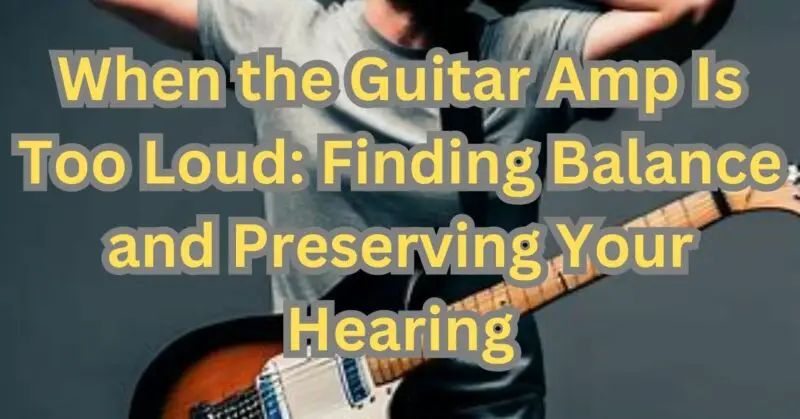Music has the power to move us, to transport us into another world. And when it comes to playing the guitar, there’s nothing quite like the exhilaration of cranking up the volume on your amplifier. However, there’s a fine line between a thrilling experience and potentially damaging your hearing. In this article, we’ll explore the consequences of playing a guitar amp too loud, discuss the importance of finding balance, and provide practical tips for preserving your hearing without compromising on the quality of your sound.
The Consequences of Excessive Volume
Playing a guitar amp at excessively high volumes can have both short-term and long-term consequences. In the short term, you risk immediate hearing damage, which can manifest as a temporary or permanent threshold shift, causing muffled hearing or ringing in the ears (known as tinnitus). These effects can be distressing and impact your ability to enjoy music, socialize, or even focus on everyday tasks.
Over the long term, repeated exposure to high volume levels can lead to permanent hearing loss. Our ears are delicate instruments, and they can only tolerate a limited amount of abuse before irreversible damage occurs. Noise-induced hearing loss (NIHL) is a common condition among musicians, and it’s a particular concern for guitarists who often find themselves in close proximity to loud amplifiers.
Finding Balance
Fortunately, enjoying the thrill of playing guitar at its fullest doesn’t mean sacrificing your hearing. It’s essential to find a balance that allows you to experience the fullness and richness of your sound while protecting your ears. Here are some tips to help you achieve that balance:
1. Invest in quality ear protection: Custom-fitted earplugs or musician’s earplugs with specific filters can attenuate the volume while preserving the clarity of the music. These can be obtained through professional audiologists or specialized music stores.
2. Experiment with amplifier placement: Adjust the positioning of your amplifier to achieve the best sound projection without having to turn up the volume excessively. Experiment with distance and angling to find the sweet spot.
3. Utilize soundproofing materials: Consider using foam panels, rugs, curtains, or other sound-absorbing materials in your practice space. These can help reduce the overall volume and minimize sound reflection, creating a more controlled environment.
4. Embrace modern technology: Many amplifiers offer built-in attenuators or power scaling features that allow you to maintain tone quality at lower volumes. Additionally, digital amp modeling technology provides the option to achieve high-quality tones without the need for excessive volume.
Preserving Your Hearing
In addition to finding balance, there are steps you can take to preserve your hearing outside of your practice sessions:
1. Take regular breaks: Give your ears time to rest and recover. Limit your exposure to loud music, especially in noisy environments.
2. Be aware of cumulative exposure: Remember that it’s not just the volume during one practice session that matters; it’s the cumulative exposure over time. Monitor your overall exposure to loud sounds and take necessary precautions.
3. Get regular hearing check-ups: Regular visits to an audiologist can help detect any early signs of hearing damage. Early intervention can make a significant difference in managing and preventing further deterioration.
4. Practice good listening habits: Be mindful of the volume levels when using headphones or attending concerts. Set volume limits on personal devices and avoid using them at maximum volume for extended periods.
Conclusion
Playing a guitar amp too loud may give you an instant adrenaline rush, but the consequences can be severe. By finding balance, utilizing ear protection, and taking steps to preserve your hearing, you can continue to enjoy the thrill of playing guitar while safeguarding your hearing for the long term.
Remember, music is meant to be enjoyed, and your passion for playing the guitar should never come at the expense of your well-being. By implementing these practical tips and making responsible choices regarding volume levels, you can strike a balance that allows you to fully immerse yourself in the music without compromising your hearing health.
Lastly, it’s important to be an advocate for hearing protection within the music community. Encourage fellow musicians, bandmates, and concertgoers to prioritize their hearing by providing information about the potential risks of excessive volume and the available solutions. By raising awareness and fostering a culture of responsible listening, we can collectively protect our ears and ensure the longevity of our musical journeys.
In conclusion, playing a guitar amp at excessive volumes can have detrimental effects on your hearing. However, with a mindful approach and the use of ear protection, you can find a balance that allows you to enjoy your music while preserving your hearing health. Take the necessary steps to protect your ears, both during practice sessions and in everyday life. By doing so, you can continue to pursue your passion for playing the guitar while prioritizing your long-term well-being.

